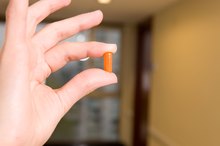Vitamins That Help With Gas
Tooting, farting, passing gas--flatulence has many names. Almost every individual experiences gas, but some have it more than others. While gas is a natural part of the digestive process, eating certain foods and herbs while avoiding others can help with flatulence.
Description
The term flatulence refers to having excess gas in the stomach or intestines. This can result in feeling bloated and/or having the need to release gas through the rectum or through the mouth by burping. Gas, or flatus, is composed of nitrogen, hydrogen, carbon dioxide, methane and oxygen. The usual source for intestinal gas is intestinal bacteria. Certain bacteria live in our digestive system and produce gas during digestion. As this gas builds, the body needs to expel it and usually does so by pushing it out through the anus.
Lactose Intolerance
How to Relieve Trapped Stomach Gases
Learn More
Individuals who are lactose intolerant or sensitive to lactose may experience flatulence after they consume diary products. Lactose is the natural sugar found in dairy products and foods containing dairy products. Individuals who are lactose intolerant generally lack the digestive enzyme lactase that is needed to properly and fully digest lactose. As a result, the lactose is not completely digested and gas occurs during digestion.
Herbs That Help
One of the easiest ways to help control gas is to consume peppermint after a meal. Peppermint candies and teas soothe digestive muscles and prevent spasms in the intestines which can cause gas. Other remedies include chewing on fresh ginger that has been soaked in lime juice and drinking 1 cup of warm water mixed with 1/2 tsp. ground ginger, a pinch of asafoetida and a pinch of rock salt after a meal. You can also mix a drop of dill oil with honey and swallow it after a meal.
Commercial Supplements
Foods You Can Eat to Help for Gas
Learn More
Commerical supplements can help prevent and combat intestinal flatulence. Gas-X and Beano contain simethicone, a mixture of polydimethylsiloxane and silica gel that reduces bloating and digestive discomfort caused by gas in the stomach and intestines. Other supplements include Alka-Seltzer Anti-Gas, Anti-Gas Ultra Strength, Baby Gasz, Equilizer Gas Relief, Gas Aid Maximum Strength, Genasyme, Maalox Anti-Gas, Mylanta Gas, Mylicon, Mytab Gas and Phazyme.
Foods to Avoid
Sugars, particularly sugar substitutes and by-products like sorbitol and fructose, digest poorly and cause intestinal gas. Starches such as wheat, oats, potatoes and corn, but not rice, can also be problematic. Often these foods may reach the colon and colonic bacteria undigested, which results in gas production. Many fruits and legumes, such as broccoli, celery, beans and lentils digest poorly, causing individuals to experience gas after consumption. This is due in part to their high soluble fiber content that keeps the food from being broken down until it reaches the colon. This delayed digestion results in intestinal gas.
Related Articles
References
Resources
Writer Bio
Lindsay Nixon has been writing since 2007. Her work has appeared in "Vegetarian Times," "Women's Health Magazine" and online for The Huffington Post. She is also a published author, lawyer and certified personal trainer. Nixon has two Bachelors of Arts in classics and communications from the College of Charleston and a Juris Doctor from the New England School of Law.








